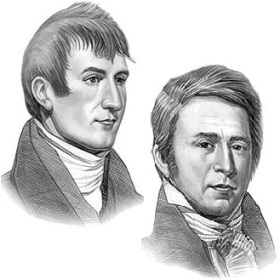|
Having
completed our celestial observations we went over to the large
island to make an attack upon its inhabitants the bears, who
have annoyed us very much of late, and who were prowling about
our camp all last night. We found that the part of the island
frequented by the bear forms an almost impenetrable thicket
of the broad-leafed willow: into this we forced our way in parties
of three; but could see only one bear, who instantly attacked
Drewyer. Fortunately as he was rushing on the hunter shot him
through the heart within twenty paces and he fell, which enabled
Drewyer to get out of his way: we then followed him one hundred
yards and found that the wound had been mortal. Not being able
to discover any more of these animals we returned to camp: here
in turning over some of the baggage we caught a rat somewhat
larger than the common European rat, and of a lighter color:
the body and outer parts of the legs and head of a light lead
color; the inner side of the legs as well as the belly, feet
and ears are white; the ears are not covered with hair, and
are much larger than those of the common rat; the toes also
are longer, the eyes black and prominent, the whiskers very
long and full; the tail rather longer than the body, and covered
with fine fur and hair of the same size with that on the back,
which ]is very close, short, and silky in its texture. This
was the first we had met, although its nests are very frequent
among the cliffs of rocks and hollow trees, where we also found
large quantities of the shells and seed of the prickly pear,
on which we conclude they chiefly subsist.
The mosquitoes
are uncommonly troublesome. The wind was again high from the
southwest: these winds are in fact always the coldest and most
violent which we experience, and the hypothesis which we have
formed on that subject is, that the air coming in contact with
the Snowy mountains immediately becomes chilled and condensed,
and being thus rendered heavier than the air below it descends
into the rarified air below or into the vacuum formed by the
constant action of the sun on the open unsheltered plains. The
clouds rise suddenly near these mountains and distribute their
contents partially over the neighboring plains. The same cloud
will discharge hail alone in one part, hail and rain in another,
and rain only in a third, and all within the space of a few
miles; while at the same time there is snow falling on the mountains
to the southeast of us. There is at present no snow on those
mountains; that which covered them on our arrival as well as
that which has since fallen having disappeared. The mountains
to the north and northwest of us are still entirely covered
with snow, and indeed there has been no perceptible diminution
of it since we first saw them, which induces a belief either
that the clouds prevailing at this season do not reach their
summits or that they deposit their snow only. They glisten with
great beauty when the sun shines on them in a particular direction,
and most probably from this glittering appearance have derived
the name of the Shining mountains.
July 3, 1805
Wednesday, 3. Nearly the whole party were employed in
different labors connected with the boat, which is now almost
completed: but we have not as yet been able to obtain tar from
our kiln, a circumstance that will occasion us not a little
embarrassment. Having been told by the Indians that on leaving
the falls we should soon pass the buffalo country, we have before
us the prospect of fasting occasionally; but in order to provide
a supply we sent out the hunters who killed only a buffalo and
two antelopes, which added to six beaver and two otter have
been all our game for two or three days. At ten in the morning
we had a light shower which scarcely wet the grass.
Next Journal
Entry
|

